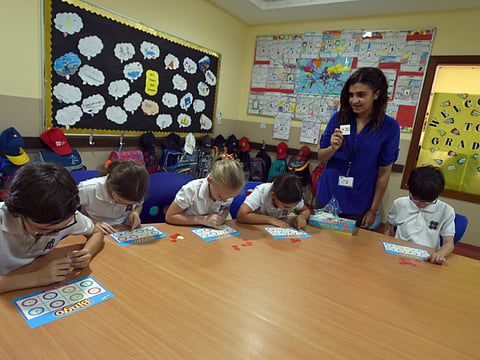Shadow teachers help kids with special needs
Trained educational assistants allow children to attend mainstream schools

ABU DHABI For eight-year-old Abdullah, going to school has never been easy. Being autistic, he has trouble expressing himself and finds learning a difficult process. And his transition to a mainstream school this year has made it all the harder to adapt to a normal classroom environment.
That is until a shadow teacher came his way.
Today his shadow teacher, Summer Kamal, is a constant presence around him in the classroom, even during the snack or play break. But he is hardly aware that he is being shadowed. Even the rest of the class is not aware that Abdullah is being assisted.
Thanks to the shadow teacher, Abdullah, a grade 1 student at Raha International School, is now able to cope with the rigours of normal schooling.
“For the class, I am a teaching assistant who helps them with their reading lessons. But I am always there for Abdullah whenever he needs a little prod or push,” said Kamal, who is also pursuing her Masters in Applied Behaviour Analysis.
There is a growing number of children like Abdullah, who attend mainstream schools with the help of shadow teachers.
In Raha International School itself there are more than 15 children, mainly in the primary section, who are accompanied by shadow teachers.
“We believe in and promote the idea that all children should have equal access to learning. In Raha, all our classrooms are inclusive,” Carmen Barrack, Head of Student Support at the school, told XPRESS.
“We help parents find shadow teachers for their wards by calling in CVs, vetting the candidates based on their prior experience and background. We facilitate the right match between the candidate and the student,” said Barrack.
Constant support
Noura Awad is a teacher who shadows a student with special needs. “I am there to give the student support only when he/she needs it. My goal is to make the student independent and not dependent on me,” said Awad, who works with the New England Centre for Children in Abu Dhabi.
“But the biggest challenge is to remain a shadow and never be an over-bearing presence around the student,” said Summer Kamal.
Abdullah’s mother Khawla is happy that Kamal’s presence in the class is helping her son immensely. “Abdullah is academically bright, yet he has trouble with the normal process of schooling as he is unable to express himself. But Kamal who has previously worked him as his case manager, understands him and is able to help him,” Khawla said.
Although there is no official figure available on the number of special needs children using shadow teachers in mainstream schools, educationalists and parents say there is a growing demand for individual learning support assistants.
A special needs teacher at an international school, who did not wish to be named, said it is difficult to find qualified shadow teachers. “At the beginning of this year, I know of at least 14 parents who were looking for shadow teachers but only seven or eight were successful in finding a suitable candidate,” said the teacher.
But many parents say the high cost involved in hiring a shadow teacher is also a big concern.
“Even if you find the right person, you are looking at anything between Dh5,500 to Dh7,000 a month,” said K.E., an Indian mother of an autistic child.
YOUSPEAK: Share your thoughts on the story?
Sign up for the Daily Briefing
Get the latest news and updates straight to your inbox



